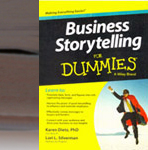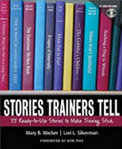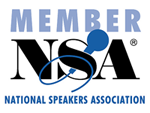For years, I marketed my management consulting firm, Partners for Progress®, by writing articles and speaking free of charge. After my book Critical SHIFT: The Future of Quality in Organizational Performance was published in 1999, on a whim I decided to pursue paid work as a keynote speaker. How difficult could it be to memorize my talks? I quickly pitched the props. Fifty garbage bags filled with thousands of overhead slides (remember those??) waited on the curb for pick-up.
My big break finally arrived. I was the opening keynote speaker for an 1100 person conference in Seattle, Washington. The night before, I practiced my presentation with my friend Bill. Learning the talk by heart wasn’t working. Bill cajoled me. “Use more examples. They’ll help people discover important points without you listing them.” I stopped cold. Somehow I’d overlooked a lesson I learned when I quit smoking: When you give up a behavior you must replace it with a better one. I’d tossed the overheads but neglected to add additional anecdotes. I stayed up all night reworking my talk.
Afterwards, I thought, “There’s got to be an easier way.” I googled “painless keynote speaking” and up popped the National Speakers Association. What could it hurt to join and attend the annual conference? Five minutes into the conference in July 2000, I was mesmerized. Then it struck me. Great speakers tell compelling stories. Stories that provoke belly laughs. Stories that trigger teary eyes. Stories that are memorable. In an hour they only cover three or four key points. No brain overload happened here. So I simplified my talks and queried colleagues for tales to tell.
I still felt something was missing but chose to go with the flow and let life take its course. It soon brought the opportunity to author Stories Trainers Tell in 2003 and Wake Me Up When the Data Is Over: How Organizations Use Stories to Drive Results in 2006. During interviews with business leaders, story practitioners, speakers, and consultants for these books, I stumbled onto more answers. Simply speaking, powerful stories have an issue, problem, conflict or dilemma at their core. There are proven ways to structure these stories to heighten their recall. Using specific techniques when telling them can captivate people’s attention. I learned how using a variety of story techniques could have huge impact on organizations through double-digit growth as well as significant cost savings and reductions in turnover.
The new book I’ve written with Karen Dietz called Business Storytelling for Dummies, is truly the icing on the cake. At its core, it’s the most comprehensive how-to guide for finding, capturing, and crafting stories for use in business-related settings. Chocked full of tips and examples, we wanted to make it easy for you! Yet, it also goes beyond a traditional Dummies book to give you the latest and greatest information in the field.
Writing these publications has given me a gift—the ability to have voice. To be heard. To make a memorable impact through my speaking and consulting work.
What about you? Do you long to be heard? Do you want to add pizzazz to your communications? Do you wish people could recall what you say? And take action on it?
If you do, come join me. Read these books and the articles I’ve posted here. Check out my blog. Watch the videos and listen to the podcasts. Actively seek out ways to employ stories each and every day in what you do.
Make a memorable impact in your work.
Learn more about Lori and her work:
Consulting: www.partnersforprogress.com
Speaking: www.lorisilverman.com
Phone: (800) 253-6398
Email: pfprogress@aol.com








